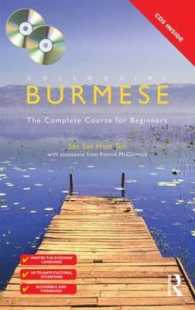- ホーム
- > 洋書
- > 英文書
- > Psychology
基本説明
Demonstrates the versatility of Bowen's theory by documenting its extension into disciplines far beyond the original psychiatric context in which it was first formulated - disciplines that include social work, primary and secondary education, and pastoral care and counseling.
Full Description
In a single volume, Bringing Systems Thinking to Life: Expanding the Horizons for Bowen Family Systems Theory presents the extraordinary diversity and breadth of Bowen theory applications that address human functioning in various relationship systems across a broad spectrum of professions, disciplines, cultures, and nations. Providing three chapters of never-before-published material by Dr. Bowen, the book also demonstrates the transcendent nature and versatility of Bowen theory-based social assessment and its extension into fields of study and practice far beyond the original psychiatric context in which it was first formulated including social work, psychology, nursing, education, literary studies, pastoral care and counseling, sociology, business and management, leadership studies, distance learning, ecological science, and evolutionary biology. Providing ample evidence that Bowen theory has joined that elite class of theories that have enjoyed broad application to social phenomena while lending credibility to the claim that Bowen theory is one of the previous and current centuries' most significant social-behavioral theories. More than a "resource manual" for Bowen theory enthusiasts, this book helps put a new great theory on the intellectual landscape.
Contents
Section I: Theoretical Considerations in Learning Systems Thinking and Bowen Theory. Comella, Observing Emotional Functioning in Human Relationship Systems: Lessons from Murray Bowen's Writings. Bourne, Various Theoretical Points People Miss: A Training Session by Dr. Murray Bowen at the Minnesota Institute of Family Dynamics. Kerr, An Obstacle to "Hearing" Bowen Theory. Papero, Responsibility for Self. Harrison, Live Learning: Differentiation of Self as the Basis for Learning. Friesen, Lester, A Systems View of the Training Program at the Bowen Center: Guiding Principles (1990-2003). Bregman, Managing Self in Emotional Fields when Presenting Bowen Theory. Section II: Established Domains for Systems Thinking and Bowen Theory. White, Learners Without Teachers: The Simultaneous Learning About Self-functioning and Bowen Theory by Supervisor, Staff, Interns, and Clients in an Outpatient Program. Howard, Clarifying Principles for Investing in Self. Hall, Can Undergraduates Learn Bowen Theory? Wilgus, Incorporating Bowen Theory into an Undergraduate Social Work Curriculum: An Exercise in the Responsible Management of Self. Kerr, Bowen Theory in Undergraduate and Graduate Nursing Education. Frost, Thinking Systems in Pastoral Training. Crimone, Hester, Across the Generations: The Training of Clergy and Congregations. Papero, How Bowen Theory Can be Useful to People in the Workplace: A Conversation with Kathy Wiseman and Dan Papero. Norton, Bringing Bowen Theory to Family Business. Romig, Bowen System Theory and the Chain Reaction of Bad Leadership and Good Leadership. Engels, Introducing Bowen Theory to Business Leaders. Bourne, Misunderstandings from the Family Field: Selected Segments by Dr. Murray Bowen at the Minnesota Institute of Family Dynamics. Section III: New Horizons for Systems Thinking and Bowen Theory. Lester, Integrating Bowen Theory with Academic Research, Teaching, and Service. Hargrove, The Critical Reader as a Scientist: Approaching Literature from the Perspective of Bowen Theory. Schur, A Supervision Model Based in Bowen Theory and Language. Knauth, Introducing Adolescents to Systems Thinking: Learning to See the Self as Part of a System. Baker, Titleman, Bowen Theory in Russia: A Training Program for Russian Psychologists. Brown, Restless Bedfellows: Taking Bowen Theory into a Child-focused Adolescent Treatment Unit in Australia. Kolski-Andreaco, Learning Bowen Theory from a Distance. Nel, Bowen Theory and Zulu Understanding of Family. Howard, Building Bridges into the Natural Sciences: Field Research on Harvester Ants. Greenberg, Social Behavior in Nonhuman Animals: A Behavioral Model of Proximate Mechanisms Based on Bowen Theory. Bourne, A Science of Human Behavior for the Future: Selected Segments by Dr. Murray Bowen at the Minnesota Institute of Family Dynamics. Appendix: Bowen Theory Training Centers & Contributor Organizations.







